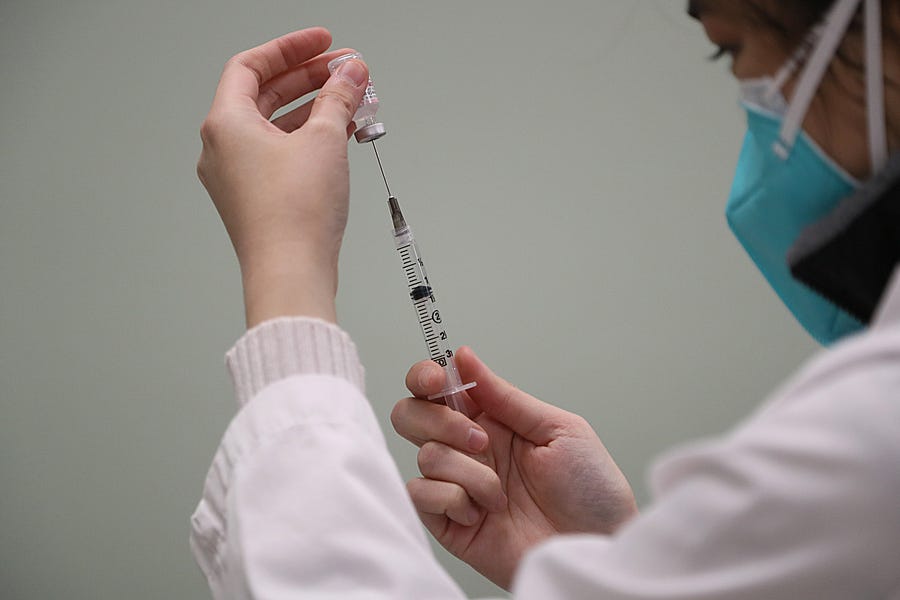Several viral social media posts are claiming that the head of Pfizer research said the COVID-19 vaccine causes female sterilization. The posts share a screenshot from a post at a blog called Health and Money News that has since been deleted but has been archived here. The article claimed that the vaccine “contains a spike protein called syncytin, vital for the formation of human placenta in women.” According to the post, the vaccine’s immune response means “we are training the female body to attack syncytin-1.”
This is a false claim. The COVID-19 vaccine does not cause female sterilization and the head of Pfizer research has not made this claim.
Pfizer issued the following statement to The Dispatch Fact Check via email, clarifying “that the Pfizer BioNTech vaccine does not cause infertility”:
There are no data to suggest that the Pfizer BioNTech vaccine candidate causes infertility. It has been incorrectly suggested that COVID-19 vaccines will cause infertility because of a very short amino acid sequence in the spike protein of SARS-CoV-2 that is partly shared with the placental protein, syncytin-1. The sequence, however, is so short, not even 4 amino acids in a row, but rather 4 shared amino acids in a sequence of 5 that it is very unlikely that it could lead to the body generating an immune response that would result in the body attacking itself or the placenta. Additionally, a study has been published that does not support this theory. The study compared the outcomes of pregnancies in women that have / have not had SARS-CoV-2 infection, which showed that SARS-CoV-2 infection during pregnancy was not associated with adverse pregnancy outcomes.
Jacob Yount, associate professor in the Department of Microbial Infection and Immunityat Ohio State University, described this claim as “a particularly insidious type of anti-vaccine propaganda because it uses scientific jargon incorrectly to create vaccine hesitancy and doubt.”
Yount clarified that the COVID-19 vaccine does not have “placenta syncytin protein or mRNA that encodes syncytin, and does not induce an antibody response against the placenta.”
He explained the “false theory” as follows:
The COVID-19 vaccines train the immune system to make antibodies targeting the virus spike protein. The virus uses the spike protein to fuse with our cells, and thus antibodies against spike prevent the virus from infecting our cells. Syncytin (pronounced sin-sit-in) is a protein produced by cells within the placenta. Syncytin is also a fusion protein that allows the outer layer of cells in the placenta to fuse with one another creating a protective barrier for the placenta.
He added that the false theory relies on the idea that, because the spike protein and syncytin are both fusion proteins, “the COVID vaccine will make the immune system attack syncytin and thus the placenta in pregnant women.”
Yount explained that spike and syncytin proteins are different even if they have “similar fusion functions.” He then explained that “there are no regions with enough of a match between virus spike and placenta syncytin that would ever make our immune system confuse the two. Further, syncytin is a natural human protein. Our immune system has tolerance mechanisms to prevent responses against our own proteins, and it’s difficult to break that tolerance. Thus, even if there was a match between spike and syncytin, it would be unlikely that a detrimental immune response would actually develop in response to the vaccine.”
The origins of this rumor come from a former Pfizer employee, Dr. Michael Yeadon, who co-wrote a petition with Dr. Wolfgang Wodarg for the European Medicines Agency on December 1 of this year, calling to stop clinical trials of the vaccine until more data became available. The petition does not directly say that the vaccine will cause infertility, but does pose the question, concluding that it’s “it is unclear what, if any, information regarding (potential) fertility-specific risks caused by antibodies is included.”
The petition also acknowledges that “there is no indication whether antibodies against spike proteins of SARS viruses would also act like anti-Syncytin-1 antibodies.”
It’s worth noting that Yeadon was previously criticized for writing an op-ed in October for a U.K.-based blog that downplayed the severity of COVID-19 and opposed restrictions by the government, according to the Associated Press.
If you have a claim you would like to see us fact check, please send us an email at factcheck@thedispatch.com. If you would like to suggest a correction to this piece or any other Dispatch article, please email corrections@thedispatch.com.







Please note that we at The Dispatch hold ourselves, our work, and our commenters to a higher standard than other places on the internet. We welcome comments that foster genuine debate or discussion—including comments critical of us or our work—but responses that include ad hominem attacks on fellow Dispatch members or are intended to stoke fear and anger may be moderated.
With your membership, you only have the ability to comment on The Morning Dispatch articles. Consider upgrading to join the conversation everywhere.